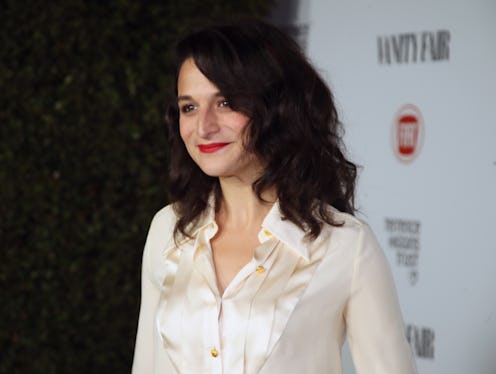Entertainment
Jenny Slate Thinks You Need Therapy

Right now, therapy is having an on-screen moment. Big Little Lies featured long sequences of Celeste getting help, the Gilmore Girls revival saw Lorelai and Emily battling it out during sessions, and Unbreakable Kimmy Schmidt devoted episodes to Kimmy taking advice from Tina Fey's less-than-stellar counselor. And in the new movie Aardvark, which premieres at this year's Tribeca Film Festival, Jenny Slate plays the therapist of a mentally ill patient (Zachary Quinto). Yet while the practice may be in the pop culture spotlight, it still faces a ton of real life-stigma — which Slate, for one, is set on tearing down.
"You see dumbasses on reality shows being like, 'I hope you get help. You need therapy.' And it’s like, guess what? We all need therapy," says the actor, speaking alongside her Aardvark co-star Zachary Quinto recently at New York's Smyth Hotel. "We all do — just like we need food and entertainment and different things that help our human nature thrive."
In Aardvark, Slate's Emily is the one providing therapy sessions for Quinto's Josh, but both characters could use some professional help. Quinto's situation is more serious — he hallucinates and doesn't take his medication — but Emily is fragile and vulnerable, prone to making poor life decisions like sleeping with Josh's TV star brother (Jon Hamm). Yet while the character may exist "in a level of dreadful incompetence," as Slate describes it, she does her best as a therapist to help Josh with his issues, something that both Slate and Quinto, as people who regularly go to therapy themselves, wholeheartedly appreciate.
"I always find that the people who are telling me what to do in my life or are giving me advice that seems harsh or aggressive or just, I don’t know, part of the patriarchy, are the dudes who do not go to therapy," Slate says with a big laugh. "Some white dude just telling me what I need to do, and I’m like, 'yeah, maybe if I were you. You need to go to therapy.'"
Both actors understand that for many people, getting counseling is a privilege; as Quinto says, "I feel grateful that I have the time and the resources to engage in it. I know not everybody does." Yet they're adamant that if it's at all possible, people should make every effort they can to get therapy, no matter what others might think. "I feel heartbroken by the stigma," says Slate, adding that for her, someone who often speaks "pretty heavily in metaphor," therapy helps bring her back to reality. "I really dwell in a dreamland," she says. "To be able to use [therapy] and work through my actual concrete behaviors in this world in that way, it’s just very soothing."
These days, however, Slate says she's more focused on dealing with the outside world than any personal struggles. "I’m really freaked out by what’s going on in our society and by our disgusting, idiotic president, and the last thing I would ever want to do is turn that on myself and say that I must be doing something wrong, or that I’m making myself vulnerable," she explains, before adding with a laugh, "I would like to turn the eye off of myself and on to what is going down in our country, because it’s scary and weird and gross, and I am not scary or weird or gross."
Analyzing herself may be off the table for now, but playing a therapist in the movies is perfectly fine — in fact, Slate says she was excited to get such a complex leading role, instead of the smaller, scene-stealing parts she's mostly known for. "It’s really nice to have a lot of work to do, rather than playing the fun friend who’s at the dinner party telling you what you need to do or whatever," she says. "It’s nice to just have a lot of material to handle."
The fact that Emily is so different than most of her previous roles was a purposeful choice, Slate adds, and she uses her self-described love of metaphor to explain why. "I feel like it’s like appetite. There are some mornings where you wake up and you’re just like, I don't know, I can’t help it, it’s a cheeseburger for breakfast," she says, laughing. "And that is how I feel about what I’ve tried to do. Sometimes I can’t satisfy those appetites, sometimes I just eat to live, but this felt like that."
Quinto, meanwhile, was attracted to the movie — which he also co-produced — due to Josh's human nature. After so many out-of-this-world roles in films like Star Trek and shows like Heroes, he was ready to take on a part more based in reality. "I found myself at a place in my career, and I’m still there, [where] I want to focus on things that are more grounded and less stylized," he explains.
And Aardvark, with its focus on therapy and the people who need it — aka all of us — is just that.